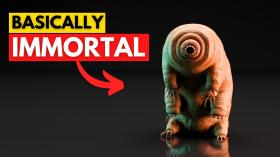#Physiology
Science & Technology | Cool Stuff
We FINALLY Understand Why Tardigrades Refuse to Die - YouTube
We've know tardigrades are tough, but new research finally tells us how they do it. Thanks to our sponsor - Doro! Check out the Doro S100 on sale now. Enjoy...
Miscellaneous | Fun Stuff
How Long Can A Human Hold Their Breath?
The short answer? It depends. The current world record is 22 minutes (!) Read the science behind why some humans last for so long.
Science & Technology | Science
Humans are evolving a new artery
More humans are being born with a third arm artery, an example of microevolution happening right before our eyes.
Science & Technology | Science
New Study Reveals Devastating Effect on Astronaut Bones From Living in Space
Astronauts lose decades' worth of bone mass in space that many do not recover even after a year back on Earth, researchers said Thursday, warning that it could be a "big concern" for future missions to Mars.
Pets & Animals | I Love Dogs
Why Do Dogs Look So Sad? - The Atlantic
Two specialized muscles give them a range of expression that wolves eyes’ lack.
Science & Technology | Science
Video Shows How Hard It Really Is to Walk on Earth After 6 Months in Space
Going to space is serious business. How serious? Well, let this video from NASA astronaut Drew Feustel tell you.
Science & Technology | Cool Stuff
What a Year in Space Did to Scott Kelly
An unprecedented and illuminating study monitored identical twins, one in space and one on Earth.
Health & Fitness | Health
98.6 Degrees Is A Normal Body Temperature, Right? Not Quite | WIRED
Fever is a more flexible concept than people assume, as new crowdsourced data helps show.
Miscellaneous | Other Kinds of Whatnot
Scientists think they have found the reason some people are left-handed — and it has nothing to do with the brain
The answer could lie in your spinal cord.
Science & Technology | Science
Physicists overturn a 100-year-old assumption on how brains work
The human brain contains a little over 80-odd billion neurons, each joining with other cells to create trillions of connections called synapses.
Miscellaneous | Other Kinds of Whatnot
How to trick your brain into thinking a rabbit is hopping up your arm | Popular Science
Everyone hates awkward pauses, and your brain is no exception.
Science & Technology | Science
Why Do We Have Blood Types?
When my parents informed me that my blood type was A+, I felt a strange sense of pride. If A+ was the top grade in school, then surely A+ was also the most excellent of blood types – a biological mark of distinction.
Miscellaneous | Interesting Links
Japanese scientist Yoshinori Ohsumi wins Nobel Prize in medicine for work on cellular 'recycling'
A Japanese scientist whose experiments explored the machinery by which cells recycle their dilapidated or unwanted contents won the Nobel Prize in physiology or medicine on Monday.



















